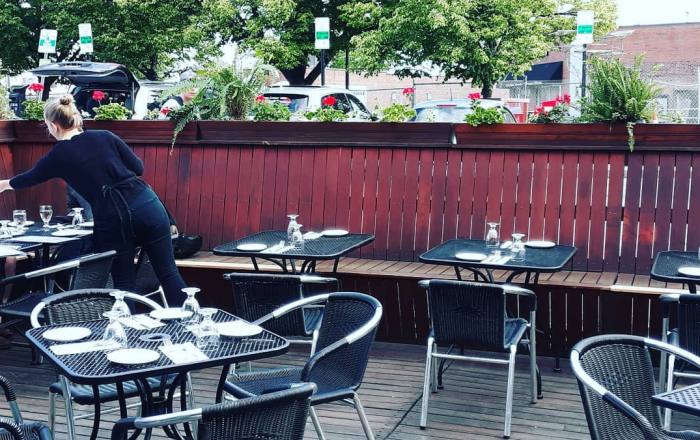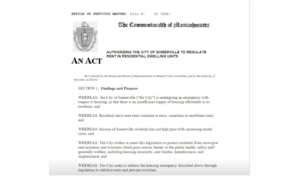Defending the decision to keep capacities low, Curtatone calls the governor’s approach “blood calculus.”
(Somerville Wire) – The city of Somerville decided not to join the rest of the Commonwealth in raising capacity limits on February 8. This rule has been applied to certain businesses and other spaces, including restaurants, stores used for retail, museums, fitness centers, and places of worship. While the state of Massachusetts has increased capacity limits to 40%, Somerville limits have remained at 25%. For outdoor gatherings, no more than 10 people are allowed to assemble together.
Mayor Joe Curtatone said that he believed the City should take this step in order to exercise caution and adhere to stricter rules than the rest of Massachusetts. In early January, Somerville saw spikes in coronavirus cases and has only recently been experiencing a slight decline. Curtatone said that he is optimistic about the decrease in cases but that the needs of the City’s most vulnerable communities must be taken into consideration. In addition, he said that Somerville must give the newly released coronavirus vaccines time to take effect.
“Across the board, on capacity limits, we’re holding steady,” said Curtatone. He added, “The governor, unilaterally on his own and without working municipalities, made a decision to lift the cap on capacity limits, against the clear warnings of the risk from health experts. We have followed those warnings, as we have all along, in an attempt to be deliberate, diligent, and methodical, in following the science. We are not rolling back at this time, though that could change. We are maintaining the course and will monitor how the pandemic is evolving.”
Curtatone stated that he is disappointed in the way that Gov. Charlie Baker has approached pandemic reopening rules, calling it “patchwork.” Different cities and regions of Massachusetts have their own rules and regulations, a situation that he said has “left us on our own, in confusion.” In a business town hall that took place on February 2, Curtatone said that Baker’s handling of the virus has been playing with people’s lives.
“If I could describe the State’s approach best … I’ll call it ‘blood calculus,’” said Curtatone. “When they’ve ramped down or taken measures to lower capacity or certain activity, they’ve described that if you reduce capacity by so much, only so many people will get sick, and this will be the economic impact. The problem with that approach is we have examples from around the world. … We have those examples of what has succeeded and what has failed. But here, I’d submit that more people have become ill and died than should have, and we could have avoided it.”
Critics of Curtatone’s reopening plan have said that the mayor essentially does follow what the rest of the Commonwealth does—just two to twelve weeks later. Steve Mackey, president and CEO of the Somerville Chamber of Commerce, said that he would like to see greater transparency in the mayor’s process, adding that he would prefer to see the health experts and scientists that the City works with become more visible. He explained that he is also troubled by the differences in regulations in cities that are very nearby each other.
“Who is saying that Somerville should stay at 25%, while Cambridge, Arlington and Medford are at 40%?” said Mackey. He added, “Can we hear from the scientists who interpret this differently than all the surrounding communities? Can we see the medical doctor who says Arlington should be this but Somerville should be that—and not a political message?”
Local businesses have been hard hit by the coronavirus, and maintaining lower capacity limits will not help them economically, said Mackey. Broadly speaking, it will take a long time for affected shops and restaurants to recover, and many are still suffering.
In terms whether maintaining capacity limits will negatively impact businesses, Mackey said, “For some it will, for some it will make no difference. For the ones that it will make no difference, they are the ones that are already closed. The ones that are making a try of it, every couple more seats would help.” He added, “There’s a perception that as soon as this is over, the storefronts and restaurants will bounce right back. Well, some might. But most of them have been severely hurt by this. …To come back after this is going to take months, if not a couple of years of rehabilitation.”
Jess Willis, chair of the Restaurant Advisory Group, said that she believes the decision to remain at 25% capacity is prudent. If there were to be a capacity increase but people still feel uncomfortable or safe going out, with the virus looming at large, it’s unlikely that the change will benefit restaurants or small businesses, as customers will still have fear, said Willis. Currently, the situation looks pretty bleak for restaurants, with many relying on federal Paycheck Protection Program loans and state grants, but Willis said that improving the public health situation must come first.
“I’d rather be at 25% percent today, if it means that I can be at 100% faster,” said Willis. “What I don’t want is to hold at 40% for two more years because we can’t get this under control.”





